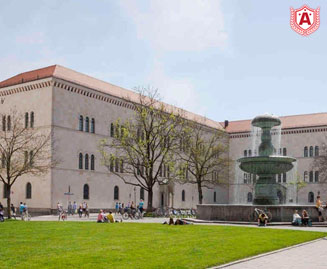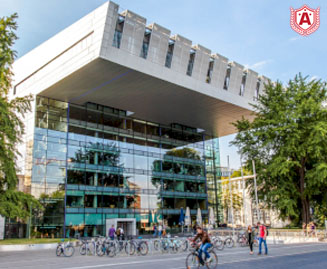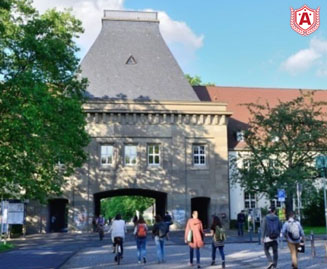Updated on Feb, 26 2025 09:11 IST
 General Medicine in Germany is one of the most respected courses for students who are willing to pursue education in this field of study. German universities and medical schools are among the best in the world, and many of them offer this degree. A high-quality education like the one offered here can set you on the path to professional success in the medical field. After completing their studies, students will be able to find employment in hospitals, government jobs in health departments, and opportunities in the research, management, and private practice sectors. You will learn many subjects theoretically and practically, like anatomy, physiology, and biochemistry. The curriculum is extensive, but the medical degree will be worth all the effort. Furthermore, the facilities and resources you will have access to will make your student journey all the more exciting and better. So, if you are willing to pursue this six-year course in Germany, checking your eligibility for MD in Germany before taking admission to one of the best MD colleges is necessary. Mentioned below are all the important details you need to know about this course and how you can study free in Germany.
General Medicine in Germany is one of the most respected courses for students who are willing to pursue education in this field of study. German universities and medical schools are among the best in the world, and many of them offer this degree. A high-quality education like the one offered here can set you on the path to professional success in the medical field. After completing their studies, students will be able to find employment in hospitals, government jobs in health departments, and opportunities in the research, management, and private practice sectors. You will learn many subjects theoretically and practically, like anatomy, physiology, and biochemistry. The curriculum is extensive, but the medical degree will be worth all the effort. Furthermore, the facilities and resources you will have access to will make your student journey all the more exciting and better. So, if you are willing to pursue this six-year course in Germany, checking your eligibility for MD in Germany before taking admission to one of the best MD colleges is necessary. Mentioned below are all the important details you need to know about this course and how you can study free in Germany.
Germany has emerged as one of the best study-abroad destinations for many students. And if you are wondering why you should study MD in Germany, here are the six best reasons.
Affordable tuition fees: The tuition fee for studying MD in Germany are comparatively lower than in other countries. Added to this is the fact that almost all public universities in Germany do not charge any tuition fees, allowing you to get free study in Germany.
Practical training: The MD program in Germany is designed in a way that promotes hands-on experience and a more comprehensive curriculum of six years. As a result, these individuals will be better equipped to enter the workforce upon graduation.
Excellent research facilities: Universities in Germany are widely recognized as some of the world's finest research facilities, making them ideal learning environments for students keen on delving deeper into their chosen fields. Having this chance will better prepare them for the future.
Job opportunities: A degree from a German university will empower you to get excellent job opportunities not just in Germany but across the globe. This is because degrees from a German university are very well-reputed among employers across the globe.
Quality of life: Germany is among the most popular countries in the world when it comes to the standard of living. It is a safe and welcoming country for international students, and hence many MD students aim to study at a German university.
Low cost of living: The cost of living in Germany is comparatively lesser than in other European countries. This means that students can have access to transportation, accommodation, healthcare facilities, etc., at lower prices in this country.
Germany is indeed one of the best destinations for those looking for world-class education in the field of general medicine (MD). But before you go ahead and inquire about the admission procedure and the scholarship and fees available, it is important to know the eligibility criteria to study MD in Germany.
Here are the requirements:
Students should be at least 17 years of age.
Applicants must have completed 12 years of school education (10+2).
They should have scored at least 60% in physics, chemistry, and biology during the 10+2 education level.
Candidates must have German language proficiency as stated below:
Level 4 in the TestDaf
Level C2 in the Goethe Institute certificate
Level 2 or 3 in the DSH German Language Certificate
IELTS or TOEFL scores of 6.5 - 7 or 90 - 100, respectively, may be needed for some courses.
NEET is required for Indian students.
International as well as local applicants must pass the TestAS or Test for Medical Studies, which is the standard entrance test for studying MD in Germany.
Students must have all the certificates of education up to the 10+2 level, including original mark sheets or statements of marks, passing certificates, transfer or leaving certificates, etc.
Researching medicine in Germany is a highly effective program that goes into many facets of public health. It's vital to be aware of the deadlines German universities set for applications if you wish to be admitted:
Summer Session: For German students, the application deadline for the summer session is the most usual. German students wishing to enroll in the summer semester must submit their applications by January 15th.
Winter Session: Winter session applications from international students are often more favorable. International applicants are urged to submit their applications a year in advance to maximize their eligibility. July 15th is the application cutoff date for the winter session.
Please be aware that German universities may have different dates for applying to their medical programs. It is advisable to check the official websites of the individual colleges to learn more extensively about each deadline.
German is the only language used in Germany for medical education. Therefore, prospective students must complete the required German language requirements to pursue their studies in the nation. German language ability is crucial for efficient communication within the academic setting and for accurate comprehension of course materials, participation in clinical training, and interactions with patients. To give a constructive and practical learning experience in medicine within the German educational system, it is essential to achieve these language standards. They should ideally have a B2 or C1 level of proficiency.
For those looking to study general medicine or MD from a German university, here is a comprehensive checklist of all the documents that will be required. By keeping this list in mind and compiling all the documents beforehand, you can ensure a hassle-free admission process.
A copy of the application form
Letter of motivation or Statement of purpose
Letters of recommendation
A blocked German account
Passport size photos
Valid passport
A German student visa
Educational transcripts
Birth certificate as an age proof
A copy of the acceptance letter from a university or medical school in Germany
Identity proof
German language proficiency certificates or scorecards
Educational certificates or mark sheets
TC or leaving certificate issued by the school
Bonafide certificate issued by the school
Entrance test scorecards
Suppose you are a student willing to pursue general medicine or MD in Germany. In that case, you might be wondering what universities are available here and which among them is the best for you. So, simplifying it for you, here is a list of the topmost universities in Germany for studying MD.

| Year of Establishment | 1386 |
| National Ranking | 1st |
| No. of Indians Students | 1600+ (Existing and Passout Students) |
| FMGE Passing Percentage | 35% |

| Year of Establishment | 1472 |
| National Ranking | 2nd |
| No. of Indians Students | 1300+ (Existing and Passout Students) |
| FMGE Passing Percentage | 30% |

| Year of Establishment | 1914 |
| National Ranking | 4th |
| No. of Indians Students | 1100+ (Existing and Passout Students) |
| FMGE Passing Percentage | 25% |

| Year of Establishment | 1402 |
| National Ranking | 5th |
| No. of Indians Students | 900+ (Existing and Passout Students) |
| FMGE Passing Percentage | 20% |

| Year of Establishment | 1527 |
| National Ranking | 6th |
| No. of Indians Students | 800+ (Existing and Passout Students) |
| FMGE Passing Percentage | 20% |

| Year of Establishment | 1870 |
| National Ranking | 7th |
| No. of Indians Students | 600+ (Existing and Passout Students) |
| FMGE Passing Percentage | 18% |

| Year of Establishment | 1457 |
| National Ranking | 8th |
| No. of Indians Students | 750+ (Existing and Passout Students) |
| FMGE Passing Percentage | 22% |

| Year of Establishment | 1409 |
| National Ranking | 9th |
| No. of Indians Students | 800+ (Existing and Passout Students) |
| FMGE Passing Percentage | 25% |

| Year of Establishment | 1964 |
| National Ranking | 10th |
| No. of Indians Students | 850+ (Existing and Passout Students) |
| FMGE Passing Percentage | 23% |

| Year of Establishment | 1780 |
| National Ranking | 11th |
| No. of Indians Students | 650+ (Existing and Passout Students) |
| FMGE Passing Percentage | 15% |

| Year of Establishment | 1710 |
| National Ranking | 12th |
| No. of Indians Students | 700+ (Existing and Passout Students) |
| FMGE Passing Percentage | 20% |

| Year of Establishment | 1477 |
| National Ranking | 13th |
| No. of Indians Students | 950+ (Existing and Passout Students) |
| FMGE Passing Percentage | 29% |
According to the leading German medical universities, the cost structure consists of the following:
| University | Tuition Fees per Semester (in EUR) |
|---|---|
| Ruprecht-Karls-Universität Heidelberg | No Tuition Fees |
| Ludwig-Maximilians-Universität München | No Tuition Fees |
| Charité – Universitätsmedizin Berlin | No Tuition Fees |
| Technical University of Munich | No Tuition Fees |
| Eberhard Karls Universität Tübingen | No Tuition Fees |
| University of Hamburg | No Tuition Fees |
| Albert-Ludwigs-Universitaet Freiburg | No Tuition Fees |
| Goethe-University Frankfurt am Main | No Tuition Fees |
| Medizinische Hochschule Hannover | No Tuition Fees |
| Rheinische Friedrich-Wilhelms-Universität Bonn | No Tuition Fees |
| University of Cologne | No Tuition Fees |
| University of Göttingen | No Tuition Fees |
Reputable agencies like the World Health Organization (WHO) acknowledge German medical programs. Scholarships to study medicine and related professions are limited in Germany. Several public colleges provide cheap tuition for a limited number of students.
DAAD (German Academic Exchange Service) Scholarships: Grants are generally granted through the DAAD financial aid program for graduate and research students. Each level of scholarship has distinct prerequisites for eligibility, and beneficiaries get a USD 850 stipend each month.
Scholarship from the Friedrich-Ebert-Stiftung for Study in Germany: Students in any subject area with good academic performance, a strong desire to study in Germany, and a commitment to social democratic values are eligible for this fellowship.
The advantages include a basic scholarship scheme that costs €934 per month.
The monthly scholarship payout for graduate students is €1,200.
A further family allowance of €276 (if necessary).
Compensation for medical bills.
It is vital to be informed that the scholarship amount will be lowered by any monthly income exceeding €400.
Anigdha has a great team of people who will help you with all the admission procedures. The steps to get admission are:
Research and selection of universities: Anigdha will help you by checking up and choosing German universities that provide education in medicine. Take into account aspects including location, program characteristics, and university reputation.
Fulfilling Requirements for Eligibility: Verify that you match the conditions for eligibility given forth by the university and the nation, which may include academic qualifications, language competency, and other prerequisites.
Language competency: Taking language competence examinations like the TestDaF or DSH may be necessary. It's vital to earn the required score.
Documentation: Assemble the appropriate documentation, such as a letter of recommendation, academic records, certificates, proof of language proficiency, and a declaration of intent. Check the exact qualifications of the university you intend to attend.
Apply for a visa: Apply for a student visa to study in Germany at the closest German embassy or consulate in your home country. Make sure you have all the necessary documentation for the visa application.
Apply to universities: Use the university's official application portal to submit your application. Please pay particular attention to deadlines as they may differ between universities.
Wait for the admissions decision: Wait for the university's decision after applying. The process of applying and being evaluated could take many weeks. Keep your patience during this time.
Acceptance and enrollment: Accept the admission offer you are provided following the university's standards. Additional documentation or enrollment fees might be required.
Making accommodations: Secure housing in Germany independently or through the university's housing services. To guarantee you have a place to stay, complete this step as soon as possible.
Financial Aid and Scholarships: Anigdha will also help you to look into alternatives for financial aid, grants, and scholarships to pay for your education. To improve your chances of winning money, submit applications far in advance.
How long does it take to complete MD in Germany?
It takes 6 years to complete an MD degree in Germany. This includes 2 years of Pre-clinical section, 3 years of Clinical stage, and approximately one and a half years of Practical learning experience.
Do I need to give an examination for Approbation after completion of MD study in Germany?
Yes. There is a final examination called the State Examination that students have to give in Germany after the completion of their MD duration. This allows them to prove their theoretical and practical abilities.
By when should I apply to a German university for MD?
Most German universities accept intakes in the winter semester, which means that the application deadlines are around July-August.
What scholarships cover my educational costs for MD in Germany from a private university?
Yes, there are many scholarships available for studying MD in Germany. DAAD, or the German Academic Exchange Service, is one of the main providers of scholarships to national and international students.
Is studying MD in Germany stressful?
As one of the most demanding programs to pursue across the world, MD will indeed be stressful to study. But Germany offers top-notch education, excellent faculty, and a wealth of resources that make it easier for you.
What is the language of instruction for MD in Germany?
MD in Germany is usually taught in German; hence students are required to have proficiency in this language. However, English as a language of instruction is pretty rare, and that too, can be seen in only a few private colleges.
Get free 1-on-1 counselling with our experts